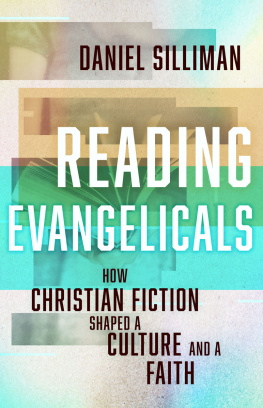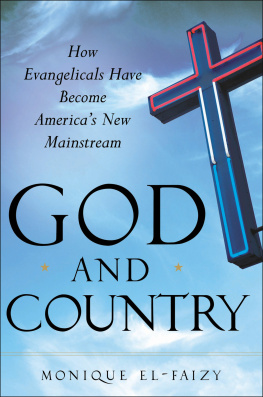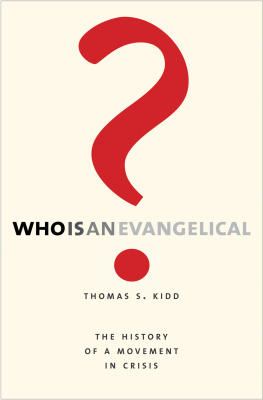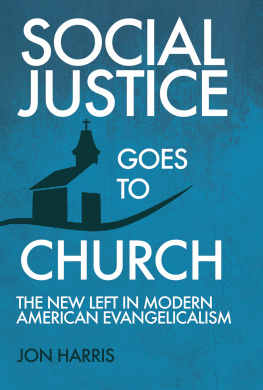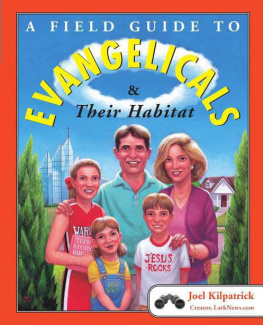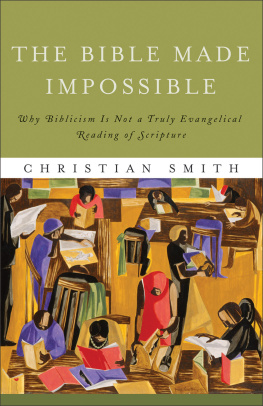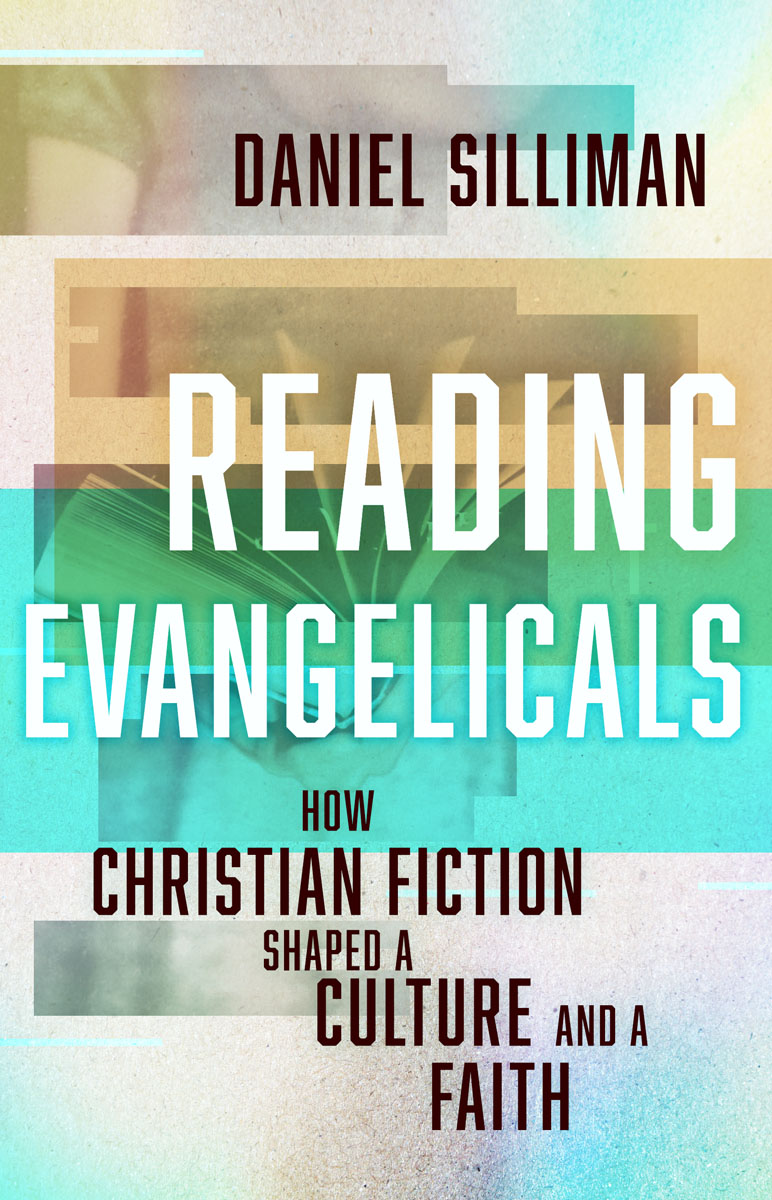

Wm. B. Eerdmans Publishing Co.
4035 Park East Court SE, Grand Rapids, Michigan 49546
www.eerdmans.com
2021 Daniel Silliman
All rights reserved
Published 2021
Printed in the United States of America
27 26 25 24 23 22 21 1 2 3 4 5 6 7
ISBN 978-0-8028-7935-6
Library of Congress Cataloging-in-Publication Data
Names: Silliman, Daniel, 1982 author.
Title: Reading evangelicals : how Christian fiction shaped a culture and a faith / Daniel Silliman.
Description: Grand Rapids, Michigan : Wm. B. Eerdmans Publishing Co., [2021] | Includes bibliographical references and index. | Summary: A historical examination of evangelical identity through a close look at five best-selling evangelical novels and the Christian publishing and bookselling industry they helped buildProvided by publisher.
Identifiers: LCCN 2021012168 | ISBN 9780802879356
Subjects: LCSH: EvangelicalismUnited StatesHistory. | Christian fiction, AmericanHistory and criticism. | Publishers and publishingUnited States.
Classification: LCC BR1642.U5 S459 2021 | DDC 277.3/082dc23
LC record available at https://lccn.loc.gov/2021012168
Contents
1.The Romance of Abundant Life
Janette Okes Love Comes Softly
2.Spiritual Warfare in Everyday America
Frank Perettis This Present Darkness
3.The Rapture Dilemma
Tim LaHaye and Jerry Jenkinss Left Behind
4.Authenticity in Amish Bonnets
Beverly Lewiss The Shunning
5.Amid Emerging Ambiguities
William Paul Youngs The Shack
Acknowledgments
I feel a little like Ive gotten away with something here. Any book is a feat. A good book is even harder, and depends on a staggering amount of generosity, good will, creativity, and collaboration. I tried to write a good book and also a strange one. Its a history of novels. Its an American studies project undertaken by an American in Germany at a German university, and it is deeply interdisciplinary, at a time when academia has decided it cannot afford thinking that happens in multiple categories at once. This book attempts to show the complexity of the architecture of American evangelicalism, insisting that the weird side doors, the stairway that doesnt seem to go anywhere, and the rooms that appear not to connect are not incidental to the structure but important to understanding what it is. There are good reasons to think that kind of book shouldnt work. I was told a bunch of times over the years why it wouldnt, and that it didnt fit, and also that there wasnt a place for me. That seems eminently reasonable when I think about it. But it also makes me incredibly grateful for the many, many peoplereally it is astonishing how manywho saw the weird thing I was trying to do and responded with enthusiasm, encouragement, and joy. Again and again, without a thought of how or whether theyd be acknowledged, much less rewarded, people gave their time, talent, and skill to make this book better and make it real. Now that Im done, the finished product feels like nothing so much as a magic trick that I dont know how I did, which is just a way of saying it was accomplished through a million acts of generosity and even more of grace. Thank you.
Thank you, Jan Stievermann, my doctoral supervisor, who started this project with a simple question about why Left Behind was fiction and what readers were doing when they read a novel about the apocalypse instead of a political or theological tract about the apocalypse. Your integrity, rigor, and intellectual honesty are unmatched, and Im proud to call you my Doktorvater and my friend.
Thanks to the Stievermanners, who were in it with me in Heidelberg, especially Jennifer Adams-Massmann, Heike Jablonski, Ryan Hoselton, and Johanna Mller.
Thanks to the scholars who supported me even when it didnt seem that there would be anything in it for them. Academia is bad for the soul, but you valued higher things. I want to especially name Timothy E. W. Gloege, Matthew Avery Sutton, Darren Dochuk, Heath Carter, Mark Noll, Kathryn Lofton, Kate Bowler, and Kristin Kobes Du Mez.
Thanks to my conversation partners in the University of Notre Dames Colloquium on Religious and History: Jonathan Riddle, Phillip Byers, Suzanna Krivulskaya, and Benjamin Wetzel, as well as Peter Cajka and Philipp Gollner. That was a terrible year for me, redeemed a little by your kindnesses and collaborative spirit.
Thank you to the people who made the Lilly Postdoctoral Fellows Program possible, especially Joe Creech, Mark Schwehn, Dorothy Bass, and Joe Goss. And a huge thanks to my fellow Lillies: Chelsea Wagenaar, Elizabeth Fredericks, Pat Gardner, Ashleigh Elser, Christine Hedlin, Jason Gehrke, and Jillian Snyder. You cant know how much it meant to me and I miss you every Monday at 4.
I also want to thank the friends who made sure I knew I was worth more than what I wrote in a day. You made my life so much better: Shawn Huelle, Johanna Roering, Tyler and Shalynn Crawford, Pam and Nathan Heald, Chris Godwin, Emily and Max Bartenbach, Erin Mehaffey Harper, Julia Kopp, Tony Cole, and especially my sister Valerie.
Thanks to my editor David Bratt, marketing director Laura Bardolph Hubers, and the folks at Eerdmans, who bought into this project with such enthusiasm.
And thank you, most of all, to my wife Beth. Your belief in this work from beginning to end has astounded me. Your love means everything. And remember when you got me the best cat? That was a good day and there have been so many good days.
From the bottom of my heart, thank you all.
Introduction
Defining Evangelicals in a Christian Bookstore
T he sign says, Closing. Everything 1040% Off!
The parking lot is slushy with yesterdays snow, and inside, people drip. They open their coats, put gloves in pockets, and smile at the clerk who greets them.
The store is more crowded than it has been in a long time. It has the happy hum of Christmas shopping, even though its March 2017. The stores sound system plays a bouncy, upbeat song:
I got an old church choir singing in my soul
I got a sweet salvation and its beautiful
I got a heart overflowing cause I been restored
There aint nothing gonna steal my joy.
Despite the cheer, the regular ring of the register signals the end of the Mishawaka, Indiana, bookstore. This is one of 240 Family Christian Bookstore outlets across the country. And the chainthe worlds largest retailer of Christian-themed merchandiseis going out of business.
Evangelical bookstores like Family Christian have been a curious feature of the American cultural landscape since the 1970s, when the number of these little stores doubled and then tripled across suburbia and annual sales swelled to an estimated $770 million per year. Now, across the country, this industry is collapsing, and all these stores are closing. Family Christian is covered in signs that say, SALE! SALE! SALE!
Im here to browse, people-watch, and think about a question Ive been working over for a number of years: What is an evangelical?
The question emerges at particular moments in the public conversation that is always rolling and roiling in America. More often than not, its because of politics. When Jerry Falwell Sr., a Baptist minister from Virginia, launched a series of I Love America rallies in 1976 and started talking about how he used to believe Christians shouldnt be involved in politics but now thought they should be because they needed to defend traditional family values, people asked, What is an evangelical? Journalists asked, and scholars, and regular people, some of whom were evangelical and had strong feelings about how the question was answered and some of whom werent, but they also had opinions about the right answer and felt, with some urgency, that it was important to have the right answer.
Next page
